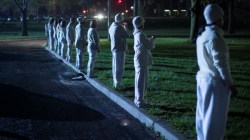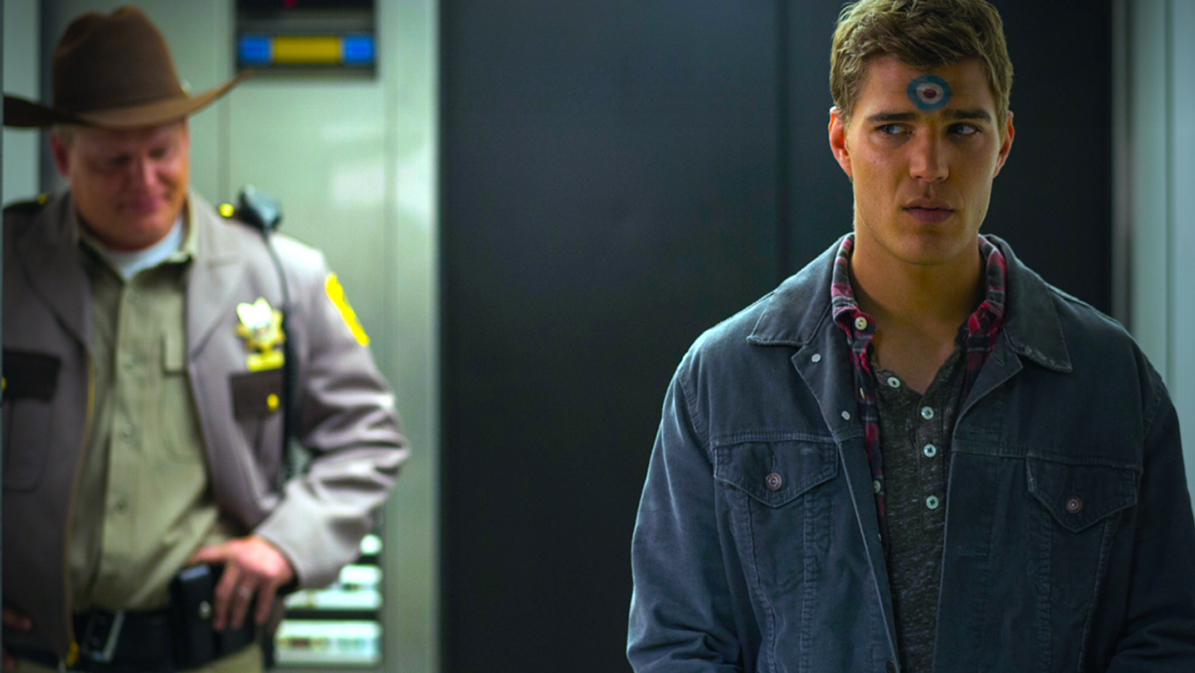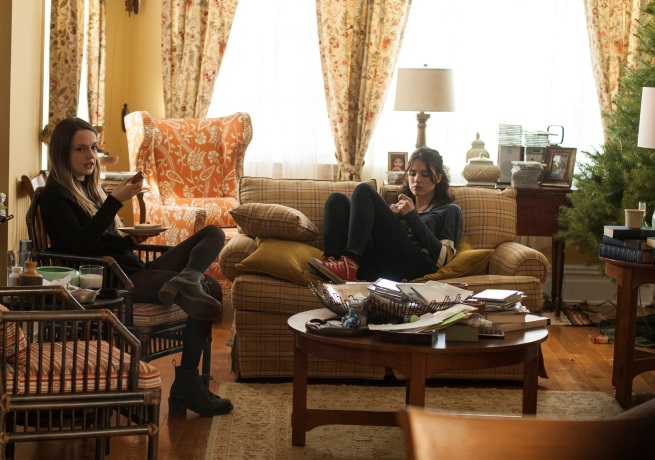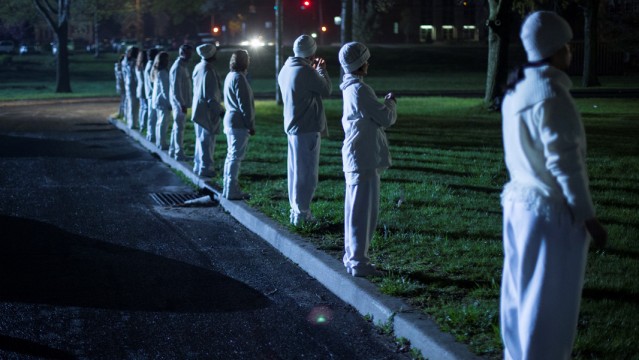Note: As with all TV recaps, there may be some mild spoilers below for those who did not watch the episode. If you're only looking for a content advisory, I'll tell you: this HBO show, were it a movie, would be rated R for language, violence, sexual content, and thematic material, but it changes from week to week. The first commentary carried a Caveat Spectator, so you can check that out.
This week it's worth noting that there are two things that some viewers may find particularly disturbing: one is a mentally disturbed man who is naked from the waist down (yes, we see it), and the other is a scene in which teenagers do things that are either blasphemous or seriously irreverent, though it's not portrayed in a positive light.
In some branches of Christianity—some of the same ones that believe in a coming literal Rapture—a figure called the Antichrist will appear halfway through the Tribulation (the seven-year period between the Rapture and Christ's final judgement of the earth) and unite the earth under his charismatic leadership before enacting his plan of evil on humanity, persecuting those who have come to faith and forcing the "mark of the Beast," some variation of 666, on everyone. He's not the devil, but he's something like his son: an inversion of Jesus.
Certain people and institutions have been fingered throughout the centuries as the Antichrist—notably, the Pope, or sometimes just the Roman Catholic church in general—but most agree that he hasn't appeared yet. (Islam has a similar figure, a "false messiah," in its theology.)
Various Christian sects differ on when the Antichrist will appear, but if you go by the same timeline as the one proposed in the Left Behind series of stories, then The Leftovers is coming up on that three-and-a-half year mark since the October 14 disappearances. The title of this fourth episode, set at Christmas, is "BJ and the AC," and though there are many things "the AC" could be—BJ, presumably in this case, being Baby Jesus—it seems like this is probably the Antichrist.
And that would make sense, because as opposed to last week's silent God, this week's Leftovers is loaded with false Christs.
 HBO
HBOThe opening credits give us a factory turning out rubbery doll heads, which are then fastened onto doll bodies, which are then dressed and packaged and sent off to toy stores, where one is purchased, undressed, swaddled, and placed in a manger scene in the middle of Mapleton. Then the baby disappears. (Everything disappears in Mapleton: people, bagels, apparitions, fake Messiahs.)
Someone stole the Baby Jesus, the townspeople presume, and though Police Chief Kevin Garvey isn't really interested in spending departmental resources on the problem when he's got a whole Guilty Remnant to worry about, let alone his children, it's made his problem. And he's going to solve it. (Though when he something to that effect in a profanity-laced sentence to another cop, his car brakes suddenly go . . . )
Kevin's going to go hunting, but it was, as he suspected, Jill who stole the Baby Jesus. Jill doesn't really care about anything anymore, except her mother, who is missing. She's enacting her own little cult in the way of Wayne, the Barefoot People, and the Guilty Remnant: a cult of devil-may-care hedonism, where everything is so meaningless that it's probably fine to near-desecrate a doll who recently stood in for Jesus. Near-desecrate, because she can't quite do it. Something alive is still buried deep down in Jill's ribcage.
Then there is Tom, with Christine—a stand-in for Joseph and Mary if there ever was one. Holy Wayne asked Tom to protect and care for Christine; God sent an angel to tell Joseph to look after Mary. And the reasoning is the same: she is special, and the child she carries is the key to it all. So Tom(/Joseph) is stuck with, or privileged with, the presence of a woman he loves who is carrying a child whose father is not him.
In this episode, Christine is nearly attacked by a man who might be unhinged yelling about seeing her in his dream (a dream that later comes true, maybe). He winds up nearly the target of a domestic violence charge. Both he and Christine stare at the phone Wayne gave them with palpable hunger to hear from him, their god, who promised he'd call. He hasn't called in six weeks. He's been silent. "You have to let me know why," Tom pleads to the phone, with its smiley-face sticker. And when that silence is broken . . . it's not divine at all.
When the Baby Jesus turns up on Kevin's doorstep, he brings it to the dance, where he meets Nora and talks, briefly, about adultery, and then goes to return the Baby to its manger, even though it's now clear that nobody cares. But there is the good reverend—now churchless—tucking his spare nativity Christ into the manger lovingly.
And as if Laurie couldn't further abandon her family, she shows up, with Meg, to ask for a divorce. Or to have Meg read her request aloud. It is the threat of final abandonment and one that Kevin, who has been left by pretty much everyone, flat-out denies. But it remains, hovering. It's not the last we'll hear of this.
Oh, and the Guilty Remnant is participating in some mild breaking-and-entering.
That is where the episode leaves us. So who is the Antichrist here? Is it Wayne? Is it the fake Baby Jesus, whom we can buy at a store? Is it the GR's leader?
Well, the answer is all in what comes next. And it depends on how you read it, too. If you're inclined to believe there is meaning beyond these people in this town and the things they find important, then you might even go so far as to believe that they are entering the second half of the Tribulation—as Wayne suggested in the first episode—and that things are about to get really bad. In that case, the Antichrist might be Wayne himself, or someone who has yet to appear.
 HBO
HBOOr if, like the Guilty Remnant, you're sure that this is all meaningless, a series of events that may or may not be the vengeance of an angry cosmos for no apparent reason, then there's barely a reason to go on. All you can do is sit, and wallow, and grow angry at those who try to go on, and chain-smoke Camels. The "Antichrist" is the baby in the manger, a source of false hope that leads people astray.
Or, if you're inclined to believe that this is all, at core, a series of terrible happenings that nonetheless can or will be explained by science, then things are going to get worse, yes, but only the usual kind of worse: people's hearts get broken, people die, people do stupid things, people hurt one another, people's marriages implode. We are the Antichrist.
But while these characters wait around for what happens next, there's no doubt: they're waiting for something. Or someone. But they can't go on much longer like this. The dogs are still closing in.
A few more notes:
- I'm noticing increasingly how silence is used in the show: it's about absence, sure, but there's also a sense in which silence forces you to talk. When someone is silent, you can either fall silent or keep talking, and a lot of people who hate awkward silences opt for the latter. This is something the GR is rather good at: just keeping quiet and staring at people, whose certainties and platitudes turn to anger, resentment, or confusion—and, sometimes (as with Meg), to a sort of conversion. Tom's phone has also gone silent in this episode, both when Kevin calls him and when he waits for Wayne. The Psalmist, too, was no stranger to silence.
- About those car brakes. There's a few theories about what on earth is going on in this town. Obviously, mysterious things do happen, and it's entirely possible that the supernatural exists in this universe after all. (I mean, people disappeared.) But it's also possible that—with the exception of the disappearances—these things are just weirdly coincidental. It depends on your outlook. For now.
- There was that very brief flashback in the very first episode that seemed to suggest that Kevin had cheated on Laurie before the disappearances; now that has been confirmed, we'll have to wait and see if anyone is involved whom we know.
- On a craft-based note, I am growing more and more impressed and pleased with how the writers (including, to his credit, Perrotta) have taken the story past its source material and breathed life into character and plotlines, tightening them up, making them mean more than they did. And I'm impressed with the religious ambiguity; Perrotta's novel seems to indicate a universe in which, beyond the disappearances, there is no mystery, no transcendence, nothing beyond us and whatever we do to get through life. The show leaves room for interpretation, and that's what good art does: it isn't complete till the viewer completes it. So, kudos to this team.











